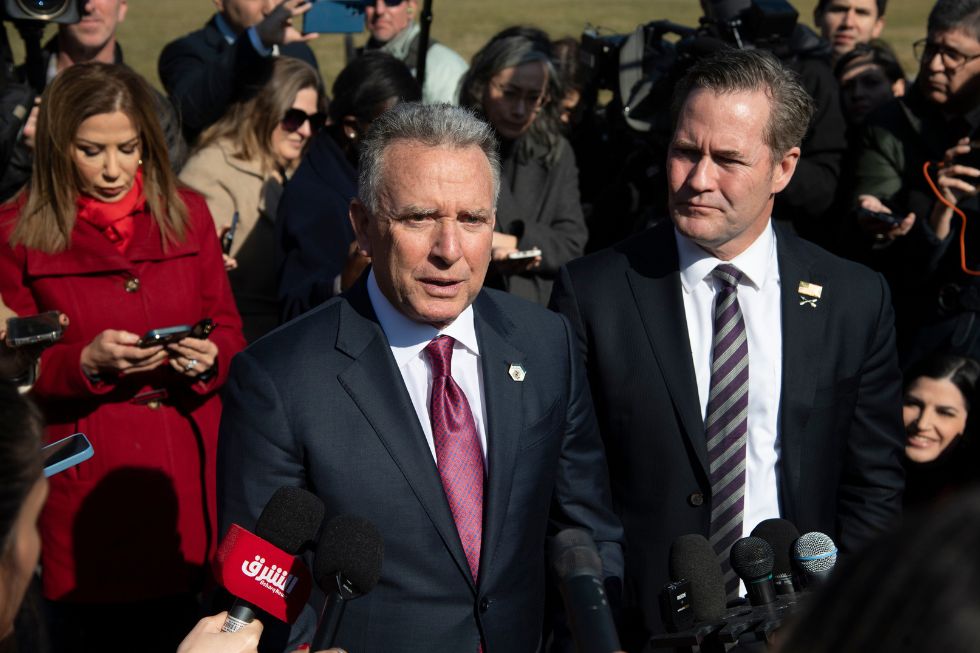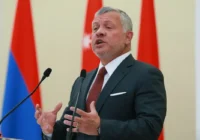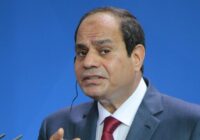A stickler for language, Israeli Prime Minister Benjamin Netanyahu twice this month remained conspicuously silent when senior officials from the Trump administration chose words that signaled potential US policy changes towards Gaza, the Palestinians and Hamas. He may not want to awaken sleeping dogs by publicly reading too much into recent statements by Steve Witkoff, US President Donald Trump’s Middle East envoy, and Adam Boehler, the president’s hostage negotiator.
Last month, Boehler set off alarm bells by speaking to Hamas directly. This marked the first ever face-to-face encounter between a US official and the group designated a terrorist organization by the United States.
Hamas’s hostages trickle out
Netanyahu also seeks to avoid suggestions that the US and Israeli policies may diverge. Even so, he cannot ignore what Witkoff and Boehler’s remarks signaled: The Trump administration might soften its attitude towards Hamas if the group releases the remaining 59 hostages it’s held since its October 7 attack on Israel, disarms and agrees not to be part of Gaza’s post-war administration.
With some 1,200 people, mostly civilians, killed in the infamous attack, that’s a no-go as far as Netanyahu is concerned. He insists there is nothing to talk about except the release of the hostages and the destruction of Hamas. In his mind, that can only be achieved militarily.
Netanyahu’s assertions are not borne out by 17 months of war, even if Israel has substantially weakened Hamas at significant cost to Gaza’s population. The majority of the 251 people Hamas and other Palestinians kidnapped in the attack have seen release in negotiated prisoner exchanges with Israel. These releases were not a result of Israeli military action.
Similarly, Hamas demonstrated in recent days that Israel’s devastation of Gaza has not deprived the group of its ability to fire rockets at Israeli cities. The organization will likely wage a guerrilla war if Israel reoccupies Gaza and takes responsibility for administering the Strip.
Finding Hamas’s humanity
A careful reading of Witkoff’s 90-minute interview with Tucker Carlson, an influential far-right podcaster who has platformed Holocaust deniers and critics of Israel, suggests Israel and the United States could find themselves on opposite sides of the Israeli–Palestinian issue. Like Boehler, Witkoff argued that he needs to understand all parties in order to do his job.
“I’ve never really been in the same room as (Hamas), which is a little bit weird, wouldn’t you say? Like a negotiation where you don’t have the other party. You don’t even know if the guy behind the wall is the Wizard of Oz,” Witkoff said.
In contrast to Netanyahu, Witkoff concluded after more than two months of indirect negotiations with Hamas that the group was not “ideologically intractable.” He seemed to imply that he may be able to do business with the group.
Based on US intelligence reports and “the rhythm and the cadence of the negotiation,” Witkoff decided that Hamas leaders were not hellbent on death and destruction.
“Once you understand that (Hamas) wanted to live, then you were able to talk to them in a more effective way. That’s when I came to the conclusion that they wanted alternatives,” Witkoff said.
The envoy added, “I don’t think anyone has a feeling that you can just kill off Hamas. It’s an idea… (but) we just can’t have an October 7 ever again. October 7 was like 9/11 in the United States.”
Earlier, Boehler said after he met with Hamas that he was trying “to identify with the human elements of those people and then build from there.” He argued that the “most productive” approach is “to realize that every piece of a person is a human.”
Witkoff signed off on Boehler’s meetings with Hamas.
Even so, Netanyahu was careful not to publicly criticize Trump and Witkoff for allowing Boehler to meet with Hamas. Tellingly, Trump reportedly removed Boehler from the hostage negotiations with Hamas, but did not fire him. This removal is unlikely to reassure Netanyahu, who views Hamas as terrorists, murderers and rapists who need to be hunted down and killed.
In late March, Hamas acknowledged that Israel had killed a member of its Political Bureau, Salah al-Bardaweel, in an air strike in the Gazan city of Khan Younis. Israel itself declared it had killed two senior Hamas security operatives, Rashid Jahjouh and Amin Eslaiah.
Israel has eliminated numerous Hamas officials since the Gaza war erupted, including its leader, Yahya Sinwar; its military commander, Mohammed Deif and its chief negotiator and head of the Political Bureau, Ismail Haniyeh.
Witkoff made clear in his interview that he rejected Hamas’s return to rule Gaza, even if he had a more layered understanding of the group.
“What’s acceptable to us is they need to demilitarize. Then maybe they could stay there a little bit. Be involved politically. But they can’t be involved militarily. We can’t have a terrorist organization running Gaza because that won’t be acceptable to Israel,” Witkoff said, seemingly parting ways with Netanyahu.
Defending targeted Qatar
Determined to defend Qatar against assertions that it was in bed with Hamas, Witkoff seemed to advise Netanyahu to drop his long-standing attempts to undermine the Gulf state’s role as a mediator. Witkoff said he could avoid engaging with Hamas directly because he trusted Qatar as his go-between.
“If I didn’t trust the Qataris, then that would be really problematic, not meeting with Hamas,” he said.
Netanyahu and his surrogates have, in recent weeks, stepped up their targeting of Qatar despite the prime minister’s convoluted relationship with the Gulf state. This campaign is as much an effort to undermine the Gulf state’s status as a Gaza mediator as it is to prevent Netanyahu from being held accountable for his years-long soliciting of Qatari funding for Hamas to keep the Palestinian polity divided between the Gaza-based group and the West Bank-based, internationally recognized Palestine Authority.
Responding to Witkoff’s interview, Doha-based Hamas official Hussam Badran insisted that the group would not disarm “as long as the occupation exists,” a reference to Israel’s presence in Gaza and the West Bank. Simultaneously, Hamas officials have repeatedly said that the group did not need to be part of Gaza’s post-war administration.
Pressuring Hamas and reimagining Gaza’s future
Witkoff suggested that the resumption of Israel’s assault on Gaza in violation of the ceasefire agreement he negotiated in January was a way of pressuring Hamas to make further concessions.
“The Israelis going in (to Gaza) is in some respects unfortunate, and in some respects falls into the ‘had to be’ bucket… We may be able to use this to get Hamas to be a whole lot more reasonable.”
Netanyahu is likely to appreciate that Witkoff’s greater understanding of Hamas did not persuade the envoy that a Palestinian state alongside Israel was the only way to resolve the Israeli–Palestinian conflict.
On the contrary, Witkoff dismissed the notion of a two-state solution as “just a word.” He went on to say that “what two-state to me means is how do we have a better living prescription for Palestinians who are living in Gaza?”
Witkoff continued: “It’s not just about housing. Maybe it’s about AI coming there. Maybe it’s about hyper-scale data centres being seeded into that area… Maybe it’s about blockchain and robotics coming there. Maybe it’s about pharmaceutical manufacturing coming there. We can’t rebuild Gaza, and it be based on a welfare system. We have to give people economic and financial prospects.”
Witkoff seemed to skirt Trump’s proposal to resettle Gaza’s 2.3 million Palestinians elsewhere and turn the Strip into a high-end beachfront real estate development.
“What we’re going to do with Gaza is going to become much more apparent over the next six to 12 months,” Witkoff said.
[The Turbulent World first published this piece.]
[Lee Thompson-Kolar edited this piece.]
The views expressed in this article are the author’s own and do not necessarily reflect Fair Observer’s editorial policy.
Support Fair Observer
We rely on your support for our independence, diversity and quality.
For more than 10 years, Fair Observer has been free, fair and independent. No billionaire owns us, no advertisers control us. We are a reader-supported nonprofit. Unlike many other publications, we keep our content free for readers regardless of where they live or whether they can afford to pay. We have no paywalls and no ads.
In the post-truth era of fake news, echo chambers and filter bubbles, we publish a plurality of perspectives from around the world. Anyone can publish with us, but everyone goes through a rigorous editorial process. So, you get fact-checked, well-reasoned content instead of noise.
We publish 2,500+ voices from 90+ countries. We also conduct education and training programs
on subjects ranging from digital media and journalism to writing and critical thinking. This
doesn’t come cheap. Servers, editors, trainers and web developers cost
money.
Please consider supporting us on a regular basis as a recurring donor or a
sustaining member.
Will you support FO’s journalism?
We rely on your support for our independence, diversity and quality.








Comment